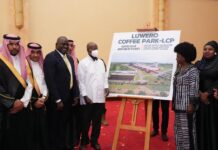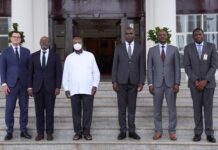By Leilah Bbaale
The Anti-Corruption Courton on Wednesday failed to continue with the hearing of the case in which State Minister for Karamoja Affairs Agness Nandutu is accused of diverting iron sheets meant for vulnerable people of Karamoja.
Hearing of the case was supposed to continue with the prosecution presenting more witnesses for cross-examination before Lady Justice Jane Okuo Kajuga, but the State Attorney Innocent Aleto told the court that the Prosecutor David Bisamunyu who has been handling the case and was expected to lead two witnesses had an accident at his home and was told to rest. Aleto thus asked the court for an adjournment.
Nandutu’s lawyer Caleb Alaka said they were ready to proceed, but they had no objection to the request of Aleto.
Justice Kajuga adjourned the case to November 6th, 2023 saying that the reason given justifies an adjournment.
The prosecution alleges that during June 2022, at the office of the Prime Minister’s Stores in Namanve and Kkola Cell Bulwanyi Parish, Mukono District, Nandutu dealt with government property consisting of 2,000 pre-painted iron sheets Gauge 28.
She is accused of receiving and holding these iron sheets, which the prosecution claims were obtained as a result of the loss of public property, an offense falling under Section 10 of the Anti-Corruption Act of 2000 as amended.
The Prosecution has so far presented two witnesses in Nandutu’s trial namely; Evelyn Hilda Bazibu a political Assistant to Nandutu who is also the Program Scheduler at NTV where the accused worked before she turned to elective politics and the Undersecretary in the Office of the Prime Minister, Geoffrey Sseremba.
Bazibu admitted before the court that she received, signed for, and collected the iron sheets on behalf of the Minister.
Sseremba whose role is to manage expenditures at the Prime Minister’s Office said that in 2022, a total of 39.94 billion Shillings was approved for peace-building activities in the Karamoja sub-region.
He added that the key to the intervention was to address the disadvantaged situations, promote or cause development in the form of infrastructure, and also extend social welfare services such as schools and health centers to the people of Karamoja.




